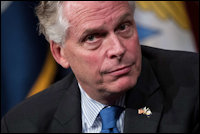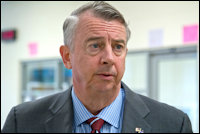 Every time I’ve seen Governor Terry McAuliffe give a speech, he’s warmed up the audience by touting all the jobs Virginia has created on his watch. And the one time I saw gubernatorial candidate Ed Gillespie speak, he emphasized that the rate of job creation has been one of the slowest in the country.
Every time I’ve seen Governor Terry McAuliffe give a speech, he’s warmed up the audience by touting all the jobs Virginia has created on his watch. And the one time I saw gubernatorial candidate Ed Gillespie speak, he emphasized that the rate of job creation has been one of the slowest in the country.

Both men can cherry pick facts to back up their positions. Virginia has created a lot of jobs over the past four years of uninterrupted national economic expansion. But the rate of job creation in Virginia has been slower than the national average.
Whether the Virginia economy is doing well or poorly depends a lot on your vantage point. Here I have to agree with Peter Galuszka, a former contributor to this blog: Viewing the state as a unitary whole is not terribly useful.
“One way to explain what is happening is to unpack the Old Dominion region by region,” he writes in a Washington Post op-ed. “Many forget that it is a huge state whose southern border runs from the Atlantic Ocean to a point on the map farther west than Detroit. It is sort of like comparing rural Maine with the New York City suburbs.”
Much of the employment success is in a crescent area from Northern Virginia to Richmond and on to the peninsula. Much of it has been fueled by federal spending and an increasingly diverse economic and population base. In September, employment in Virginia grew by 34,000 in total.
September figures show that Northern Virginia grew by 10,700 jobs compared to the same month in 2016. Some of that may be federal spending. Not far behind in jobs growth is Richmond, which added 10,500 jobs, mostly through the private sector that brought in new businesses such as real estate firm CoStar.
Not so in somewhat forgotten areas such as Danville and Martinsville, which are struggling to make comebacks after the demise of tobacco and furniture manufacturing a couple of decades ago. Ditto Southwest Virginia, where coal production took a nosedive around 1990 and never recovered, leaving local government coffers in need of tax revenue and young people on the move elsewhere.
Here are some other basic truths to remember next time someone credits or blames a governor with success or failure of Virginia’s economy. Job creation in Virginia is driven by two things primarily: the performance of the national economy, and the state’s industry mix. Look at any chart comparing economic growth in Virginia and the U.S., and the two move in the same cyclical patterns. If Virginia over-performs or under-performs the national cycle, more than half the difference can be explained by the state’s industry mix. The biggest “industry” is the federal military-intelligence-homeland security sector. When that sector booms, Virginia booms. When it falters, Virginia falters.
That’s not to say Virginia’s business climate doesn’t matter. It does, a lot. But on the margin. The effects of an incremental move up or down in the business climate can take years to show up in stronger or weaker job creation numbers. And let’s remember this: Virginia’s business climate rankings reflect broad institutional strengths and weaknesses that take years, even decades, of positive or negative massaging. Any improvement in (or degradation to) in K-12 schools, higher education, workforce training, transportation infrastructure, taxes, labor laws, the legal climate, and the dozens of other factors that contribute to the business climate is the work of governors, the General Assembly, the judiciary, local governments, and, yes, citizens.
Even in the realm of corporate recruitment, the governor’s role can be overstated. Governors don’t identify prospects or do the months, even years, of grunt work that goes into reeling in a big corporate investment. Economic development professionals do. For the most part, governors don’t get involved until deals reach the serious talking stage. But when a deal is closed, the governor’s office writes the press release and the governor takes the limelight. That’s the way it works today, and that’s the way it’s always worked.
Any governor who claims credit for hundreds of thousands of jobs created is pulling your leg. Any candidate who claims he can turbo-charge Virginia’s economy is pulling the wool over your head. We need to dispense with the idea that a super-hero governor can swoop in and pump up the economy. What we Virginians can do is slowly and patiently assemble the building blocks of a better business climate in the expectation of seeing incrementally more investment and job growth over time. After a decade or two, we can say we made a big difference. That’s not a message that drives voters to the polls who want results now, but it has the virtue of being true.


